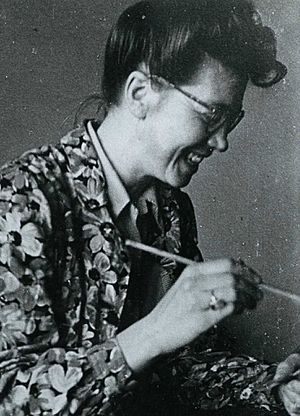Berta Hansson facts for kids
Berta Elisabet Hansson (1910–1994) was a talented Swedish artist and teacher. She is famous for her unique style, known as Expressionism. She especially loved painting pictures of children.
Berta first worked as a schoolteacher. But in 1940, she started attending Otte Sköld's art school and began to paint. A writer and artist named Elsa Björkman-Goldschmidt was very impressed by Berta's art. She helped Berta have her first art show in 1943. People loved her work, and soon Berta became a full-time artist.
In the 1950s, Berta spent a year in South Africa. She was very sad about the unfair rules for black people there. When she returned to Sweden, she showed her feelings against these rules in her paintings and textile art. Later in her life, she also started making sculptures. She created beautiful portraits of children using clay and bronze. You can see her amazing artworks in Swedish museums like Nationalmuseet and Moderna Museet.
Contents
Berta's Early Life and Education
Berta Elisabet Hansson was born on June 23, 1910. Her family lived in a place called Hammerdal in Jämtland County, Sweden. Her father, Daniel Hansson, was a farmer.
After her mother and older sister passed away, Berta convinced her father to let her go to high school. She studied in Sigtuna, where she learned about art, books, and ideas. After high school, she went to teacher training college in Umeå. She earned her teaching diploma in 1934.
Becoming an Artist
For the next ten years, Berta worked as a schoolteacher. She taught in a small village called Fredrika in northern Sweden. She always tried to include drawing in her lessons. Some of her best drawings are of the children from Fredrika.
In 1938, Berta met a painter named Leoo Verde during a teaching trip. He encouraged her to start using paints. Two years later, she took painting lessons from Brita Nordencreutz. She also attended a summer art course at Otte Sköld's painting school in Stockholm.
In the early 1940s, while Berta was still in Fredrika, the writer Elsa Björkman-Goldschmidt discovered her paintings. Elsa was so impressed that she helped Berta have her first art show in Stockholm in 1943. Art critics were amazed by how original and sensitive her art was. Even though some thought her paintings of children looked a bit like cartoons, everyone agreed she was a very special artist.
Art and Activism
After World War II, Berta was able to travel to different countries. She visited France, Italy, and Egypt. In 1953, she spent a year in South Africa. She worked at a Swedish mission station and helped create an art program for schools in KwaZulu-Natal.
Berta was very concerned about the unfair treatment of black people in South Africa. This system was called apartheid. She showed her strong feelings against these unfair rules in her art. She started to focus more on textile art, creating large fabric pieces for public places.
Later Works and Legacy
In the 1970s, Berta began to create sculptures. She made portraits of children using terracotta clay and bronze metal. In her later years, she painted birds from her imagination. She often used only black and white because she found it hard to see colors.
Berta Hansson was an Expressionist artist. This means her art focused on showing feelings and emotions rather than just what things looked like. She is often compared to other famous Swedish artists like Siri Derkert and Vera Nilsson.
Berta Hansson passed away in Stockholm on September 3, 1994. Her art continues to inspire many people today.


